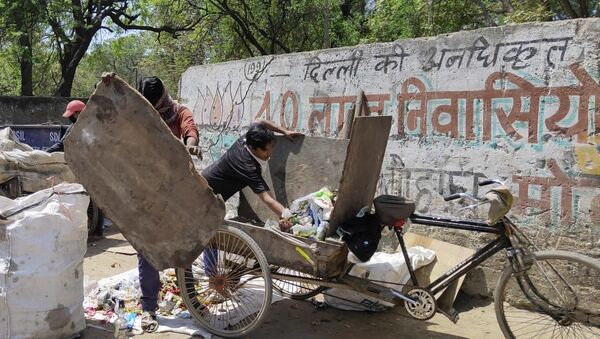India is locked down in a bid to break the cycle of COVID-19 spread, but a large number of workers are still sanitising cities and towns. The workers in the frontline against COVID-19 tend to be badly paid and don't have the usual service benefits enjoyed by regular employees.
While their services were recognised by the Modi in a televised address to the nation on 19 March, they have not been offered any special protection by the government.
"From doctors to nurses, hospital staff, sanitation workers, airlines employees, government staff, police personnel, media people, people associated with train-bus-auto rickshaw services, and home delivery agents; all have been selflessly serving others, without caring about themselves," said Modi.
Plight of workers
“We don’t get our salaries on time. We take so much risk venturing out every day, yet when we take leaves, our salaries are cut,” said a sanitation worker unloading a pile of trash from his vehicle.
Working out on field and risking thier lives during Covid-19, #sanitationworkers in #Delhi share their plight. #CoronavirusOutbreak #coronavirusindia
— Shweta Sharma (@Ss22Shweta) April 10, 2020
For @SputnikInt pic.twitter.com/p77lFf9Lmg
The coronavirus crisis highlights the plight of sanitation workers who have been hired as casual workers, but are deprived of any benefits of regular jobs.
They face uncertainty in job and wages, as they are contracted by service providers of the government. While government employees enjoy the benefits of leave, medical assistance, these sanitation workers have no such perks. It’s difficult for a casual sanitation worker even to claim compensation in case a worker dies while performing his duty.
“We are protecting the public right now and we ourselves do not have protective gears. No one has even taken stock of our situation yet or asked if he have masks and gloves,” said another worker do did not wish to be named.
Similarly, a public health department for malaria, which currently undertakes the sanitisation of public spaces to contain the spread of coronavirus, does not have enough personal protection equipment.
Employees of public health department of Malaria, currently undertaking sanitisation for coronavirus, share how they are fighting this crisis and how can the government support them better.#noprotectivegears #FrontLineHeroes #CoronavirusOutbreak pic.twitter.com/R3OO9OBHFq
— Shweta Sharma (@Ss22Shweta) April 10, 2020
“Policies and monetary compensations have been rolled out for permanent government employees, but nothing specific for contractual employees even when they face greater risk. We want similar policies for us,” said Jai Bhawan Sharma, Assistant Malaria Inspector, a contractual employee.
Present Scenario and Rights
More than 5 million sanitation workers are employed in India on contractual basis. India has seen several protests by Safai Karmachari Andolan (Sanitation Workers Movement), an NGO, which demanded regularisation of jobs and better wages and working conditions.
The workers also face caste discrimination, as a sizeable number of them belongs to Dalits - people belonging to the lowest strata of the Indian caste-system.
The government announced an insurance scheme of INR 50 lakh ($65,785) for frontline health workers, which includes sanitation workers after the outbreak of COVID-19. But it is not clear if contractual and casual workers would be eligible for its benefits.
India's Federal government enacted the Unorganised Workers Social Security Act, 2008, which includes sanitation workers. It stipulates devising policies by both the federal and state governments on disability cover, health and maternity benefits and old age protection to workers including sanitation workers. But the legislation is still not implemented on the ground.
Need Of The Hour
Anjal Prakash, Research Director and Adjunct Associate Professor, Indian School of Business, suggested several measures for the welfare of these workers.
“The contractual sanitation workers should be given all the benefits which are extended to the permanent sanitation workers as both of them are exposed with the same level of risk and so there should not be any discriminations, if any.”
Prakash said, though there are legislation for the welfare of contractual workers, their employers often flout the rules to avoid paying up higher wages and other benefits to them.
According to the Contract Labour (Regulation and Abolition) Act, 1970, employers cannot hire labour on a regular employment basis for jobs that are perennial in nature.
Talking about the shortage of PPEs for these workers, Prakash said, “The government cannot do this alone. They should give a call for individuals and organisations to come forward and help them in spreading the awareness and distribution of PPE kits.”
India currently has 6039 active cases of COVID-19 had 206 deaths, according to the federal Health and Family Welfare Ministry.





